|
|
|
Sort Order |
|
|
|
Items / Page
|
|
|
|
|
|
|
| Srl | Item |
| 1 |
ID:
086664
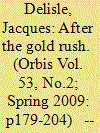

|
|
|
|
|
| Publication |
2009.
|
| Summary/Abstract |
Four months after the Beijing Olympics, on the vast plaza beside the games main venues, workers fought gusty winds and freezing temeratures to erect, incongruously, scores of artificial Chistmas trees while a handful of hawkers futilely pushed discounted memorabilia.
|
|
|
|
|
|
|
|
|
|
|
|
|
|
|
|
| 2 |
ID:
090972
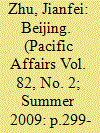

|
|
|
|
|
| Publication |
2009.
|
| Summary/Abstract |
The 2008 Beijing Olympics and the emergence of China in recent years have attracted a rising interest and new research on various aspects of this country including, for example, architecture, urban planning and the history of cities.
|
|
|
|
|
|
|
|
|
|
|
|
|
|
|
|
| 3 |
ID:
093968
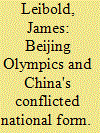

|
|
|
| 4 |
ID:
086957
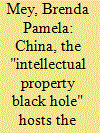

|
|
|
|
|
| Publication |
2009.
|
| Summary/Abstract |
After a hard-fought battle that saw China clinch the bid to host the XXIX Olympic Games, the country put comparable efforts into upgrading its intellectual property laws, not only to bring them into consonance with the provisions of the Agreement on Trade-Related Aspects of Intellectual Property Rights (TRIPS), but also to accord the Olympic-related intellectual property rights the appropriate protection. Despite these efforts, China is still plagued with a myriad of TRIPS compliance problems. The Olympic Games presented the opportunity that China needed to light the torch that would help it repair the damage caused to its image by issues such as reverse engineering of almost everything under the sun, as well as those relating to enforcement and protection of intellectual property rights (IPRs), etc., and cause it to be seen in a positive light by the rest of the world. The world watched China closely for the weeks of the Olympic Games and will be watching it, even after the Olympic torch has flickered out, to see whether the enforcement and protection of IPRs will outlast the Olympic ceremony.
|
|
|
|
|
|
|
|
|
|
|
|
|
|
|
|
| 5 |
ID:
101113
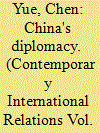

|
|
|
| 6 |
ID:
094084
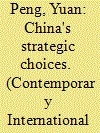

|
|
|
| 7 |
ID:
086951
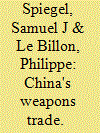

|
|
|
|
|
| Publication |
2009.
|
| Summary/Abstract |
China is among the largest exporters of arms to the developing world and is often criticized for exacerbating violent conflicts in Africa. This article examines geopolitical tensions surrounding some of China's most controversial weapons alliances, rethinking the role of the global media, state leaders and non-state actors in forming fragmentary movements of 'resistance'. Focusing on the tensions around a shipment of Chinese arms to Zimbabwe during a period of mid-election repression and violence in 2008, this article is a media content analysis on the debates about diplomacy, arms embargoes, regime violence, protests against the Beijing Olympics, and efforts by China to counter western critics. The article argues that more rigorous diplomatic efforts to block the weapons were required and that the moral and political hazards of unreflexive foreign policy analysis emboldened the Chinese authorities' denial of their responsibilities. Beyond the case of Zimbabwe, we suggest that a deeper and wider understanding of 'geopolitical resistance' against violence is vital.
|
|
|
|
|
|
|
|
|
|
|
|
|
|
|
|
| 8 |
ID:
108381
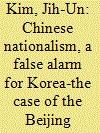

|
|
|
|
|
| Publication |
2011.
|
| Summary/Abstract |
Chinese popular nationalism has been spotlighted as a source of the "China Threat" in interpreting the country's foreign policies by China scholars, especially, so-called constructivist pessimists. However, the applicability of this interpretation is quite limited when Sino-South Korea relations are examined. Though it is true that the anti-Korean sentiment of the Chinese has seriously grown in recent years, it has not affected the government's foreign policies to Korea. On the contrary, it has been played down or counter-balanced by the government, its media, and academics of China, as the period around the 2008 Beijing Olympics, when negative feelings surged, clearly illustrates. Chinese nationalism is not a threat to South Korea and cannot be generalized as a variable explaining Chinese foreign policies.
|
|
|
|
|
|
|
|
|
|
|
|
|
|
|
|
| 9 |
ID:
131254
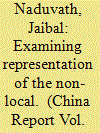

|
|
|
|
|
| Publication |
2014.
|
| Summary/Abstract |
This article examines how the United Kingdom's media represents contemporary China. Using the context of the Beijing Olympics, the article examines the UK media's representation of China through the prisms of ideology, history and geopolitics. Using Content Analysis, the inquiry examines news reports on the Olympics published in the UK's 'national newspapers' (as classified by Lexis Nexis) between 9 May 2008 and 8 August 2008, the three-month period immediately preceding the games. The article finds the UK media's narrative on China prejudiced by ideological differences, biases traceable to historical presuppositions, and anxieties emanating from China's resurgence on the world stage.
|
|
|
|
|
|
|
|
|
|
|
|
|
|
|
|
| 10 |
ID:
089390
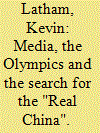

|
|
|
|
|
| Publication |
2009.
|
| Summary/Abstract |
The Beijing Olympics were about more than just sporting competition. They were about China and its role on the international stage. The Games were explicitly recognized for their role showcasing China's economic, technological, cultural, social and environmental achievements to the rest of the world. The Beijing Games were therefore inevitably going to lead to a process of contestation between competing representations, understandings and identifications of China, and a common motif of this process became the designation of what is or is not the "real China." This article focuses on the notion of the "real China" and the debates and contestations surrounding it in Chinese and foreign media over the months running up to and during the Olympics. It will identify what these debates and contending claims about the "real China" may reveal for a broader understanding of the role of media in the country and our need to rethink our approaches to both.
|
|
|
|
|
|
|
|
|
|
|
|
|
|
|
|
| 11 |
ID:
095865
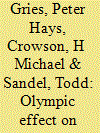

|
|
|
|
|
| Publication |
2010.
|
| Summary/Abstract |
This paper explores the impact that increased exposure to China during the two and a half weeks of the Beijing Olympics had on American attitudes towards China. A large N longitudinal survey revealed a significant increase in negative attitudes towards China from the beginning to the end of August 2008. Statistical analysis revealed no dominant explanation for this change, however. Instead, personality (openness), ideology (social dominance orientation and right wing authoritarianism), and media exposure each had a small impact on changing attitudes. Further research (including a follow-up experiment manipulating the valence of media coverage of China) suggested both the possibility of an 'efficiency effect', whereby China's very success in both hosting and competing in the Olympics generated increased American anxiety about China, and a 'cheating effect', whereby stories about underage Chinese gymnasts and deception (e.g. lip synching while another child actually sang during the Opening Ceremonies) diffused broadly through social networks, uniformly and negatively impacting American attitudes towards China.
|
|
|
|
|
|
|
|
|
|
|
|
|
|
|
|
| 12 |
ID:
153401
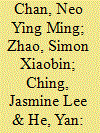

|
|
|
|
|
| Summary/Abstract |
While global commentators hail the unprecedented success of the Beijing Olympic Games, few have commented on the methods employed to promote urban development in China. This article develops a conceptual framework to unfold the Beijing Olympics and China’s mega-event urbanization model, which feature ‘playing games for leveraging land’. Literally, this informally translates to ‘concept creation’ and ‘land and finance leverage paradigm’. Based on a detailed investigation of the way China has dealt with mega-events such as the Olympics and the Asian Games, this article begins with an analysis on the well-known Chinese ‘land and leveraged finance’ model. However, it goes a step further to reveal a much bigger picture and brings to light the deeper underlying logic behind China’s ‘mega-event urbanization model’ as well as its legacy and consequence. It unfolds the intriguing relations between central and local governments; between functional/institutional systems (land, taxation and banking) in regard to territory and space; and between economic and political dynamics (local competition for both economic/GDP growth and individual political aspirations). This development model is unique to China and extraordinarily unconventional on a global scale which is unparalleled by any past experiences in other countries that have hosted the Olympic Games and other similar events. The ramifications of such ambitious and untested strategies could yield negative impacts on China’s long-term development and harm the world economy in the global scale.
|
|
|
|
|
|
|
|
|
|
|
|
|
|
|
|
| 13 |
ID:
086273
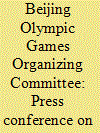

|
|
|
| 14 |
ID:
090731
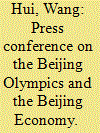

|
|
|
| 15 |
ID:
090733
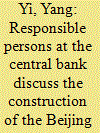

|
|
|
| 16 |
ID:
085413
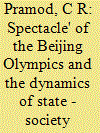

|
|
|
|
|
| Publication |
2008.
|
| Summary/Abstract |
The preparations for the 2008 Beijing Olympics can be analysed to reveal the changing nature of the state, society and market forces and their mutual interaction in the People's Republic of China (PRC). It is also useful in understanding the consensual aspect of the Chinese state. Examining how the Beijing Olympics is being organised as a spectacle is important in understanding how Chinese state power has developed and maintained its consensus vis-É-vis the society in the post-Mao period. This process of institutionalisation of state, society and market interactions in the field of sport could provide insights regarding parallel developments in other sectors as well in China today.
|
|
|
|
|
|
|
|
|
|
|
|
|
|
|
|
| 17 |
ID:
096177
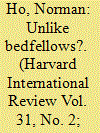

|
|
|
|
|
|
|
|